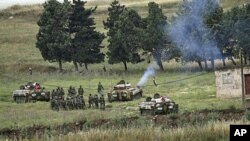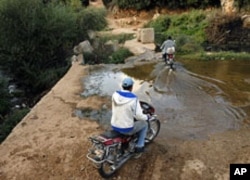On a dusty plateau across from the Syrian city of Homs, a small group of Lebanese and Syrian activists and smugglers are busy working. Couriers riding motorbikes arrive at a safe house carrying portable flash drives loaded with photographs and videos of street protests, and of dead and wounded protesters, for transmission around the world. They operate in a Lebanese border area called Wadi Khaled, which has become a lifeline to Syrians and the frontline in the struggle to topple the regime of Bashar al-Assad.
Wadi Khaled is a long valley flanked by high, rocky ridges that run along Lebanon’s northeastern border with Syria. Overlooking the valley, less than fifty yards away from Syria, is the village of Karha. The village so close to Homs that gunfire and explosions coming from there are clearly heard while activists type on laptops, send text messages and make dozens of phone calls from a safe house. Couriers are constantly coming and going.
Gruesome cell phone video footage of a man named Sheikh Nader, who had been shot and killed by Syrian security forces near Homs less than two hours before, arrived and was immediately uploaded to the group’s Facebook and YouTube pages.
“We do this not only to show the world what is happening in Homs. This is so Sheikh Nader and all of the other martyrs before him are never forgotten,” says Abed, a Syrian in his early 20s from Deir Baalbeh, where Sheikh Nader was killed. As Abed uploaded the video to Facebook, two young children played on straw mats in the small concrete room where they all sleep.
Together with several friends, Abed runs Homs Revolution News, a Facebook page and corresponding YouTube page where photographs and videos that are smuggled across the border are posted. USB flash drives can be carried across the border and their contents uploaded online in under an hour, the activists say.
The activists use a satellite internet connection and move frequently. Fear of Syrian mukhabarat permeates their ranks. People have disappeared from inside Lebanon, they say, at the hands of Syria’s secret police who can freely cross the border, too.
In a new report, the U.N. put the death toll from the seven-month Syrian uprising at just over 3,000. But most here believe that the real number of dead is far higher.
The Crossing
Roughly three miles from the official Bqayaa border crossing is an unofficial - and heavily trafficked - crossing over the Kabir River. A steady stream of young men emerge from footpaths in the underbrush nearby, joining others on Chinese motorbikes laden with goods bound for Syria. Local residents and Syrian refugees say that the safest time to cross here is during the day, because at night the Syrian army steps up its patrols in the area.
The vast majority of Lebanese in Wadi Khaled sympathize with the Syrians.
“Of course we must help them. They are our brothers,” says Khodr, a Lebanese man in his early 30’s who, like many here, will give only his first name. Khodr uses his minivan to shuttle people and goods to various points along the valley, day and night. He rarely sleeps more than a few hours at a time.
Refugees living in Wadi Khaled are, for the most part, safer than they would be in Homs and the surrounding towns, but their living conditions are grim. The lucky families who arrived early on during Syrian army’s crackdown are holed up in the concrete hulks of unfinished homes. Newcomers live under tarps in makeshift communities along the Kabir River where sanitary conditions are dire.
A middle-aged dentist from Wadi Khaled named Mustapha explains that while he’s not directly involved with the activists or smugglers and doesn’t consider himself to be very political, he sympathizes with the Syrians across the border and those who have fled. Mustapha offers his services free of charge to much of the growing refugee community.
“You see how they are living here? These conditions are unacceptable for any person,” Mustapha says, pointing to a cluster of tarp tents on the banks of the Kabir. “And every night there are more bombs, more deaths. Living here is their only hope and we must help them.”
A Long Struggle
Movement across the border on the Kabir River has been unrestricted for generations. Many families live on both sides and trade between villages thrives. The official border means little, if anything at all, to residents here.
Young Lebanese and Syrian boys loitering at a gas station in Wadi Khaled hurled expletives not only at Assad, but also at Iranian president Mahmoud Ahmadinjead and the Secretary General of Hezbollah, Hassan Nasrallah, for supporting the Assad regime. They wanted to know if western countries believed that Assad would fall, and if they would step in as they did in Libya. The young boys swore that Assad would last only a few months more, at best.
But quietly, some of the men around Wadi Khaled aren’t so sure.
“Hafez was much stronger than Bashar is,” Khodr says, referring to the late president of Syria, and father of Bashar, Hafez al-Assad. “But he has surprised us all. Everyone thought he would be gone by now,” he says, standing in the doorway of a warehouse in Karha.
The storeroom is sparsely stocked with cooking oil, light bulbs, baby formula, dry foods, fuel and other necessities waiting to be sent across to Syria. “They have nothing in Homs,” he says, referring to the virtual siege the city has been under since May.
And though conditions on both sides of the border are grim, the activists keep going. With a wide smile, Abed says he is sure that anti-government activists will ultimately succeed in removing the Assad family from power after four decades. He and the others here say they have come too far, and have spilled too much blood to stop. “We will win, because we have no other choice.”
















